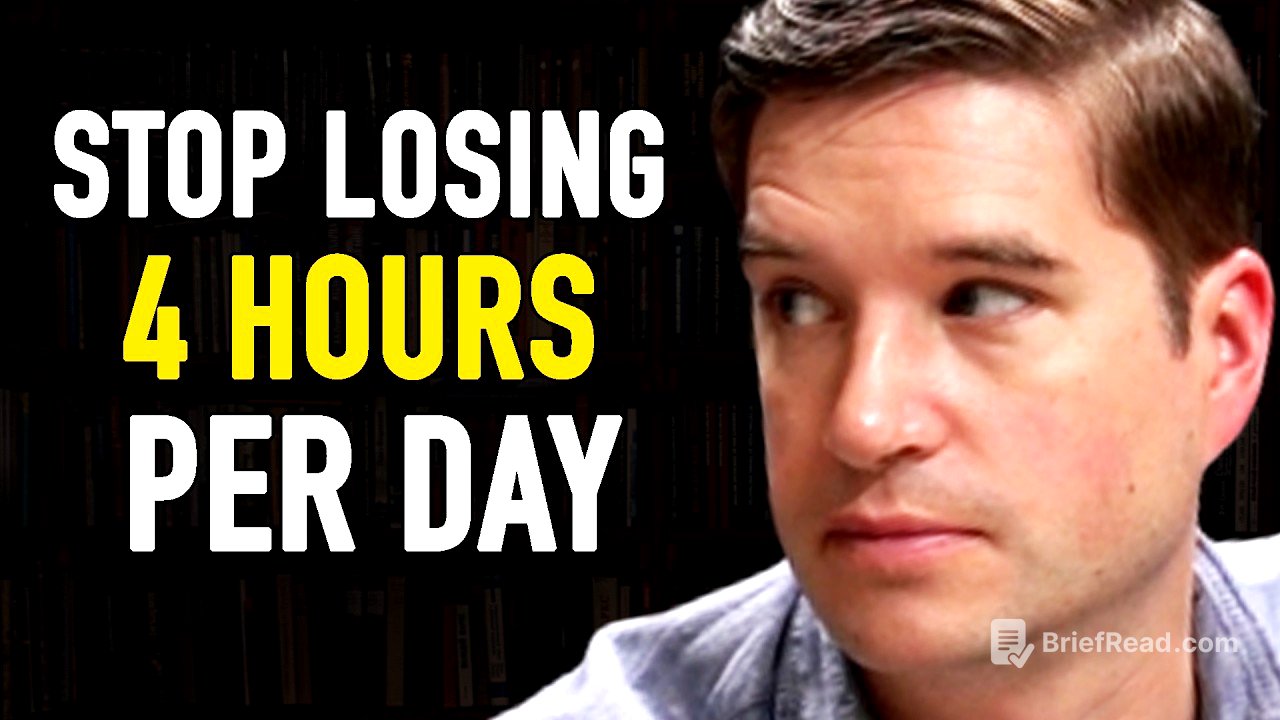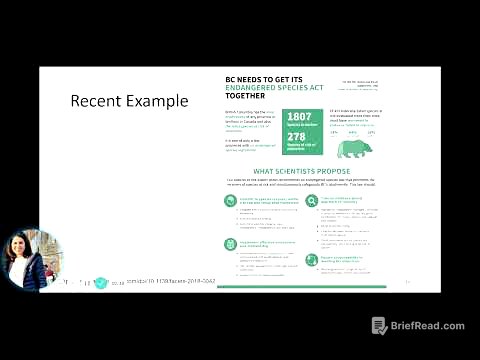TLDR;
This YouTube video by Cal Newport covers a range of topics, starting with a discussion on quitting social media using the analogy of ultra-processed foods. He then answers questions about analytical thinking, remote internship productivity, developing secondary skills, and how TikTok's algorithm works. The video also includes a case study on analog productivity methods, a listener call about career advice, and concludes with a review of books Cal read in May 2025.
- Social media is like ultra-processed food, offering hyper-palatable content that can be harmful.
- Analytical thinking can be improved by reducing context switching and increasing comfort with boredom.
- TikTok's algorithm uses weighted random sampling to personalize content effectively.
- Agentic AI is currently most useful in computer programming, but its broader applications are still uncertain.
- Simple, analog productivity methods can be highly effective.
Quit Social Media [0:00]
Many people are unhappy with the amount of time they spend on social media but struggle to quit. The reluctance stems from the fear of overreacting, similar to past moral panics over technologies like cars, comic books, and television. However, social media, particularly platforms like TikTok, can be compared to ultra-processed foods, engineered to hijack our desire mechanisms. Unlike general processed foods, which can be consumed in moderation, ultra-processed content should be avoided altogether due to its hyper-palatable nature and potential for psychological harm. This perspective provides a coherent argument for why quitting social media might be necessary despite past overreactions to new media.
How can I become a better, more analytical thinker? [17:12]
To improve analytical thinking, one should avoid context switching to maintain focus and mental clarity. Long-term improvements involve becoming more comfortable with boredom by engaging in activities without distractions. Implementing the "20-10 rule," which includes reading 20 pages daily and spending 10 minutes alone with one's thoughts, can train the brain to process information more effectively. Gradually increasing these activities to the "30-15 rule" and eventually to 50-60 pages of reading with 20-30 minutes of reflective thinking can significantly enhance cognitive abilities.
How can I stay motivated, productive, and balanced while working mostly alone during my first remote internship? [23:03]
To stay motivated, productive, and balanced during a remote internship, it is crucial to implement time block planning. This involves structuring the workday with specific blocks for work, breaks, email, and a clear shutdown routine to separate work from personal time. Without physical separation or in-person supervision, adding structure through time block planning becomes essential to maintain focus and prevent work from blending into personal life.
How much time should I dedicate to developing secondary skills? [24:15]
Secondary skills should be downplayed and learned only when their direct benefit to primary, valuable skills is clear. The main focus should be on developing rare and valuable skills that produce unambiguous value. Obsessing over becoming so good that one cannot be ignored should be the priority, with secondary skills serving as utilitarian enhancements rather than diversions from achieving demonstrable success.
How does TikTok seem to know so much about me? [26:15]
TikTok's algorithm personalizes content effectively through a process of weighted random sampling. Each video is described by a series of numbers representing various categories, creating a multi-dimensional space. The algorithm then probabilistically selects videos based on watch time, favoring content near other videos the user has watched. This simple loop, repeated with vast amounts of data, allows TikTok to accurately predict user preferences without needing semantically rich descriptions or complicated rules. The algorithm's simplicity means there are limited controls to adjust its behavior, making it difficult to fine-tune for specific outcomes.
What are the best workflow strategies when using AI agents? [37:50]
Agentic AI, particularly in computer programming, involves using control software to query language models for ideas and plans, then taking actions based on the responses. A key challenge is the waiting time for these queries, which can disrupt workflow. To mitigate this, it's recommended to have a to-do list for the larger project to work on during these waiting periods, maintaining cognitive context and productivity. While agentic AI shows promise, its broader applications beyond software development remain uncertain.
A simple, analog approach to productivity [43:38]
A maintenance technician's method of planning his year hour by hour using a simple notepad exemplifies an effective analog approach to productivity. By dividing each page into days and allocating specific tasks to each hour, he maintains clarity and focus, preventing himself from being pulled in too many directions. This simple system underscores the importance of allocating time to the right tasks to achieve career capital and sustainability, without over-optimizing with elaborate digital systems.
Too focused on metrics [47:25]
A caller, Im Felino, seeks advice on transitioning from a successful lecturing career to doctoral studies. The key recommendation is to work closely with an advisor on high-quality papers to learn the necessary skills. By actively participating in the advisor's projects and finding ways to be useful, one can gradually increase their involvement and expertise, eventually leading to independent research and publications in top venues.
The 5 Books Cal Read in May, 2025 [55:10]
Cal Newport reviews five books he read in May 2025. These include "Building: A Carpenter's Notes on Life and the Art of Good Work" by Mark Ellison, a memoir on craftsmanship; "Thoreau's Axe" by Caleb Smith, an academic exploration of focus and attention in 19th century America; "Nine Innings" by Daniel Okrent, a classic baseball book; "The Let Them Theory" by Mel Robbins, a popular self-help book; and "Against a Machine" by Paul Kingsnorth, a high-idea book critiquing modern capitalism and technology.









